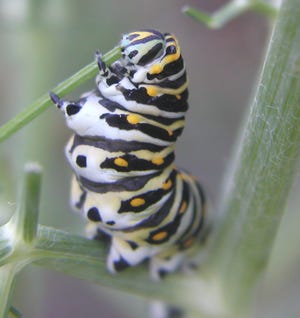April class series teaches Florida-friendly growing growing practices
On April 4, I will start out instructing the Florida-Helpful Landscaping course sequence.
This training course, which runs from 9 a.m. to noon for 8 consecutive Tuesdays, will train you how to develop plants right here in Florida and deliver you with answers to all your burning concerns. The course will be held at the UF/IFAS Extension workplace, 3695 Lake Drive, Cocoa.
The first course, which I believe is the most vital for gardening achievement in Florida, will include gardening with the soil foods world wide web, followed by composting and vermicomposting.
I will describe how nature’s foodstuff website supports plants by providing vitamins and minerals and guarding them from illnesses. In addition to their nutrient-cycling attempts, the soil food stuff website produces natural and organic make any difference, which will increase the soil’s drinking water and nutrient-holding capacity.
This enhanced potential not only positive aspects the plants but also safeguards h2o quality, which the Indian River Lagoon and St. Johns River the two desperately need.
The soil food world-wide-web builds soil, composition which provides deeper, aerobic soils so tree roots can mature more into the soil, resulting in additional sturdy and stable trees all through storms.
The 2nd part of the class will address thermal composting and vermicomposting. The aim of composting isn’t just to generate natural make any difference, but to also produce soil microbes that assist plants. The addition of natural matter to our sand is valuable, but when the soil foodstuff net is absent, it will only be a issue of time in advance of the natural and organic make any difference is eaten, sooner or later disappearing. For everyone who can not, or would somewhat not compost, I will provide facts on merchandise that can be applied to increase daily life to the soil and all plant surfaces also.

Much more from Sally:Take edge of March’s cooler weather with these gardening chores
Far more from Sally:Bats, soil health and Indian River Lagoon major topics for garden seminar
Class two on April 11 will go over attracting wildlife, ending with the 9 rules that make up Florida-Welcoming Landscaping.
If you have not read about our Keystone species of native vegetation that support migratory birds and our indigenous bees, this will be thrilling new info. I will also address Data on how to attract pollinators, these as bees and butterflies, and hummingbirds.
The class will conclude with a dialogue of all 9 ideas of Florida-Helpful Landscaping
- Correct plant, suitable put
- Drinking water proficiently
- Fertilize properly
- Mulch
- Entice wildlife
- Regulate property pests
- Responsibly recycle lawn waste
- Reduce storm drinking water runoff
- Secure the waterfront
The 3rd class, on April 18, will start out with fingers-on gardening. In this class, anyone will learn how to commence their possess plants from seed, prune a plant, start new vegetation from cuttings and divide vegetation.
The past topic protected that day will be an introduction to landscape style and design. Landscape layout, like vogue and inside design and style, is subjective, and if you have thought about what you are looking for in your landscape and factors you never want, like a higher servicing lawn, why not attract up your own style?
An important factor, when drawing the structure, is to use the mature unfold of the plants. Carrying out so will avoid you from investing excessive money and finally acquiring to take away vegetation as they develop into crowded. I can also help course users with their styles as the class progresses.
Course 4 on April 25 will be all about growing a nutritious lawn and palms. Master how a balanced garden can advantage the Indian River Lagoon or the St. Johns River and not lead to hurt. If you are at this time expanding non-native palms and they do not have a total cover of solid green fronds, this class will supply the information and facts that your palms require.
The fifth course, May 2, will be all about trees.
Trees supply a lot of rewards, which involve escalating property values. Subject areas that will be covered involve the physiology of trees, tree framework, and purchasing, creating, and sustaining trees. The second 50 percent of the course will be a wander about our office to test out the native crops you could want to take into consideration adding to your lawn.
In class range six, May well 9, you will discover how to improve edible crops. This is quick to do when you understand the suggestions and tips. For edible crops, there will be conversations on increasing vegetables, herbs, fruit crops, and citrus.
Class 7 on Could 16 will deal with plant diseases and Integrated Pest Management. When we get the biology back into the soil and additional than 70{a57a8b399caa4911091be19c47013a92763fdea5dcb0fe03ef6810df8f2f239d} of the plant, this details may perhaps not be essential. But until that time, you will learn how to diagnose and manage sickness and insect outbreaks, with the minimum amount of affect on the surroundings.
The final course on Might 23 will include pesticide basic safety and a synthesis of all the data protected. When pesticides are not used effectively, they can induce damage to non-goal organisms, these kinds of as bees, fish, animals and the human applying them.
This information and facts is vital for every person who applies pesticides. The last part of the class will be to review most of the prevalent causes, both of those abiotic and biotic, that can hurt or destroy vegetation. This awareness will assist each gardener understand the early warning signals when a plant is experiencing difficulties, although there is even now time to help save it.
Gardening is a good pastime that receives us exterior and active, additionally it is a pleasurable way to keep limber. Of class, it is the most gratifying when our plants are accomplishing properly.
If you want a much healthier, additional interesting (or delectable) landscape, look at having this $75 course. Go to 2023fflclassseries.eventbrite.com to sign up.
For individuals who just cannot make the class, but still want to obtain out how to include biology again to the soil, e-mail the Learn Gardeners at [email protected] and they will send you the details.
Sally Scalera is an city horticulture agent and grasp gardener coordinator for the University of Florida’s Institute of Foods and Agriculture Sciences. E mail her at [email protected].
